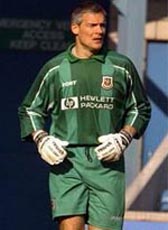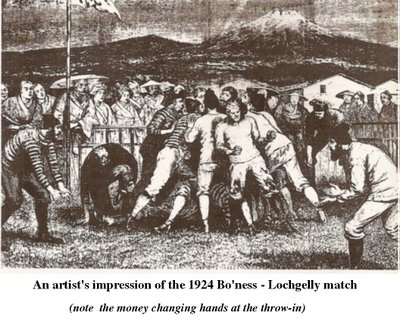The Absolute Game Revisited - Part 29
JIM'LL FIX IT
 One of the worst things that can happen in any game or sport is cheating by the participants. It can simultaneously result in the undeserving being triumphant, the deserving being deprived of legitimate victory and the spectators being duped and short-changed.
Cheating can, of course, take many forms, ranging from the steroid nightmare of Ben Johnson to your erstwhile best mate surreptitiously dealing himself three threes while you're away for a pish.
I recall Bobby Charlton appearing as a TV pundit during the 1974 World Cup visibly struggling to control his emotions in the face of Brazil's tactics in their match with Holland. The Brazilian team that year were an insult to their 1970 predecessors and their game-plan against Cruyff and Co largely seemed to consist of biting, gouging, spitting, jersey-pulling and body-checking, with sporadic fore-arm smashes thrown in for good measure. After one particularly crude off-the-ball piece of action had gone unnoticed by the officials, Bobby exclaimed in exasperation, "Well, it's terrible, they're just... they 're just... they 're just…….cheating ".
At the time I laughed at what seemed to be typical English prissiness. But I must be getting old, because now I understand exactly what Bob was on about, and I agree with him. The methods of cheating at football are many and varied and space does not permit a full analysis here. The particular aspect that I want to deal with is that of players being bribed to effect a particular result. This has obvious topicality in the light of Marseille's recent expulsion from this season's European Cup.
I need a fix (' cos my team's going down)
Many of us have been brought up on a diet of Bruno Glanvilla's alter ego; Brian Glanville, and thus are privy to the machiavellian machinations which (used to?) occur on a daily basis within Italian football. Bribery and corruption are to Serie A what Lennon and McCartney are to sixties beat music. The sine qua non, if I may lapse into the original Italian patois. Everybody's heard of Lobo/Solti even if the precise details now escape us. One thing's for sure, Italian football and unsavoury under-the-table dealings are inextricably linked in our consciousness.
In that same World Cup in 1974 when the Brazilian unarmed combat team were being dismantled by the Dutch, a similar fate was befalling the Italians at the hands of a very talented Poland team. There is substantial evidence to indicate that as the Polish players were trooping off at half-time 2-0 ahead and cruising, they were met in the tunnel by a number of swarthy gents, all called Luigi, and all equipped with suitcases bulging with lira, who were enquiring if there was any chance that they could see their way to letting in three in the second half. Fortunately the Poles declined this generous offer, though they may have got a little something for keeping their own tally at two.
There are myriad stories linking dubious penalties for Italian clubs in the European Cup competitions with the sudden acquisition by the referee of a numbered Swiss bank account, a Fiat or Lamborghini, a holiday in Venice, a Rolex watch, a dozen cases of Asti Spumanti, a cuddly toy, a Brucie-bag and a wok.
One thing I can never understand is why the Italians feel it necessary to pay money to referees or opponents. A more reliable technique is allegedly practised in other areas by their Sicilian branch. I would have thought that rather than
"You let in a goal we give you 21 million lira, OK ",
a more persuasive offer would be
"You don’t let in a goal we break more than one of your legs, yes ".
Chris Brookmyre's articles on playground football in TAGs 32 and 34 reminded me that it wasn't always advisable to display the full range of your mazy ball-skills when the "best fighter" was on the other team. The threat of violence is usually a fairly powerful determining factor in deciding which side of the post to place the penalty kick. It might have been more interesting if the Poles had been confronted by violin-cases rather than suitcases.
One of the worst things that can happen in any game or sport is cheating by the participants. It can simultaneously result in the undeserving being triumphant, the deserving being deprived of legitimate victory and the spectators being duped and short-changed.
Cheating can, of course, take many forms, ranging from the steroid nightmare of Ben Johnson to your erstwhile best mate surreptitiously dealing himself three threes while you're away for a pish.
I recall Bobby Charlton appearing as a TV pundit during the 1974 World Cup visibly struggling to control his emotions in the face of Brazil's tactics in their match with Holland. The Brazilian team that year were an insult to their 1970 predecessors and their game-plan against Cruyff and Co largely seemed to consist of biting, gouging, spitting, jersey-pulling and body-checking, with sporadic fore-arm smashes thrown in for good measure. After one particularly crude off-the-ball piece of action had gone unnoticed by the officials, Bobby exclaimed in exasperation, "Well, it's terrible, they're just... they 're just... they 're just…….cheating ".
At the time I laughed at what seemed to be typical English prissiness. But I must be getting old, because now I understand exactly what Bob was on about, and I agree with him. The methods of cheating at football are many and varied and space does not permit a full analysis here. The particular aspect that I want to deal with is that of players being bribed to effect a particular result. This has obvious topicality in the light of Marseille's recent expulsion from this season's European Cup.
I need a fix (' cos my team's going down)
Many of us have been brought up on a diet of Bruno Glanvilla's alter ego; Brian Glanville, and thus are privy to the machiavellian machinations which (used to?) occur on a daily basis within Italian football. Bribery and corruption are to Serie A what Lennon and McCartney are to sixties beat music. The sine qua non, if I may lapse into the original Italian patois. Everybody's heard of Lobo/Solti even if the precise details now escape us. One thing's for sure, Italian football and unsavoury under-the-table dealings are inextricably linked in our consciousness.
In that same World Cup in 1974 when the Brazilian unarmed combat team were being dismantled by the Dutch, a similar fate was befalling the Italians at the hands of a very talented Poland team. There is substantial evidence to indicate that as the Polish players were trooping off at half-time 2-0 ahead and cruising, they were met in the tunnel by a number of swarthy gents, all called Luigi, and all equipped with suitcases bulging with lira, who were enquiring if there was any chance that they could see their way to letting in three in the second half. Fortunately the Poles declined this generous offer, though they may have got a little something for keeping their own tally at two.
There are myriad stories linking dubious penalties for Italian clubs in the European Cup competitions with the sudden acquisition by the referee of a numbered Swiss bank account, a Fiat or Lamborghini, a holiday in Venice, a Rolex watch, a dozen cases of Asti Spumanti, a cuddly toy, a Brucie-bag and a wok.
One thing I can never understand is why the Italians feel it necessary to pay money to referees or opponents. A more reliable technique is allegedly practised in other areas by their Sicilian branch. I would have thought that rather than
"You let in a goal we give you 21 million lira, OK ",
a more persuasive offer would be
"You don’t let in a goal we break more than one of your legs, yes ".
Chris Brookmyre's articles on playground football in TAGs 32 and 34 reminded me that it wasn't always advisable to display the full range of your mazy ball-skills when the "best fighter" was on the other team. The threat of violence is usually a fairly powerful determining factor in deciding which side of the post to place the penalty kick. It might have been more interesting if the Poles had been confronted by violin-cases rather than suitcases.
 Here Comes The Bribe
Well, the Italians we know about. And now the French. You just can't trust these foreigners. Unlike us Brits who are always true and honourable. Things like that couldn't possibly happen here.
Except for those occasions when they have.
The recent allegations against Marseille stirred a faint childhood memory of some sort of bribery scandal in England in the early sixties, and I scurried off to the library to find out more.
Here Comes The Bribe
Well, the Italians we know about. And now the French. You just can't trust these foreigners. Unlike us Brits who are always true and honourable. Things like that couldn't possibly happen here.
Except for those occasions when they have.
The recent allegations against Marseille stirred a faint childhood memory of some sort of bribery scandal in England in the early sixties, and I scurried off to the library to find out more.
 The rest of this article is shamelessly plagiarised from Simon Inglis excellent book Football in the Dock. We pride ourselves in Scotland as being the real inventors of the game, and it is only fitting that it was Scots who were the pioneers in the world of football-related bribery. Two former Scotland internationals (one ex-Celtic and one ex-Rangers) led the way in 1924 by trying to fix the result of a vital 2nd Division match between Bo'ness and Lochgelly. (Are you sure you're not making this up? - Ed).
Inconveniently for them, a couple of members of the local constabulary were standing on the other side of the hedge listening to the instructions and the money being delivered to the Bo'ness goalie. They both got 60 days hard labour, but in an act of mercy the judge banned them both from attending any further Lochgelly fixtures. Next in to Barlinnie was a Falkirk businessman who got three months for attempting to bribe the Stenhousemuir goalie in a match against Broxburn United. The Falkirk man attempted to hand £50 to goalkeeper J Shortt at Larbert railway station. Shortt let the money slip through his grasp and into the net, but it was too late for the Falkirk man to back out and, adding insult to injury, he went off to the slammer in the knowledge that Stennie had won 6-2 (you bloody well are making this up - Ed).
In 1932 a former captain of Montrose offered £50 to the Montrose left back to fix a match against Edinburgh City. The instructions which accompanied the money were pithy and to the point, viz:- “Lie down and if goals don't come quickly enough give away a penalty".
60 days.
The rest of this article is shamelessly plagiarised from Simon Inglis excellent book Football in the Dock. We pride ourselves in Scotland as being the real inventors of the game, and it is only fitting that it was Scots who were the pioneers in the world of football-related bribery. Two former Scotland internationals (one ex-Celtic and one ex-Rangers) led the way in 1924 by trying to fix the result of a vital 2nd Division match between Bo'ness and Lochgelly. (Are you sure you're not making this up? - Ed).
Inconveniently for them, a couple of members of the local constabulary were standing on the other side of the hedge listening to the instructions and the money being delivered to the Bo'ness goalie. They both got 60 days hard labour, but in an act of mercy the judge banned them both from attending any further Lochgelly fixtures. Next in to Barlinnie was a Falkirk businessman who got three months for attempting to bribe the Stenhousemuir goalie in a match against Broxburn United. The Falkirk man attempted to hand £50 to goalkeeper J Shortt at Larbert railway station. Shortt let the money slip through his grasp and into the net, but it was too late for the Falkirk man to back out and, adding insult to injury, he went off to the slammer in the knowledge that Stennie had won 6-2 (you bloody well are making this up - Ed).
In 1932 a former captain of Montrose offered £50 to the Montrose left back to fix a match against Edinburgh City. The instructions which accompanied the money were pithy and to the point, viz:- “Lie down and if goals don't come quickly enough give away a penalty".
60 days.

Heart of Gauld
The big bribery scandal in the early sixties was, thankfully, confined to England, and featured a trio of celebrated players (Kay, Swan and "Bronco" Lane) two of whom (Kay and Swan) might well have been part of England's 1966 World Cup squad had they not become entangled with a match-fixing syndicate. True to form however, there were Scottish connections. There was suspicion that at least one Scottish league player was in on the act and was supplementing his income by "arranging" results, while one of the leading villains in the English set-up was Jimmy Gauld frae Aberdeen, who literally became a football "Jim'll Fix It".
Jimmy's career took him to Waterford, Charlton, Everton, Plymouth, Swindon, St Johnstone, Mansfield and Wormwood Scrubs (this last one is not a now-defunct English league club, but was Jimmy's domicile for four years as a reward for his diligent efforts in the field of match-fixing).
Another Scottish connection came in the ample form of one Dick Beattie, who at the time of his arrest was the St Mirren goalkeeper. Dick had previously played for Celtic and had received under-23 caps for Scotland. Prior to joining the Paisley Buddies, Dick had sojourned in England in search of fame and fortune with, amongst others, Peterborough United, where he was described as "an artist". Well, that's not quite right. The full description was "Beattie was an artist at deliberately letting in goals while appearing to have unluckily missed making a miraculous save ".
In one game against QPR which Beattie had down as an away win on the fixed odds, the score was still 1-1 with only seconds remaining. Dick had been searching in vain for a suitable opportunity to tip the balance, but a combination of ineptitude by the QPR forwards and sterling work by his defensive colleagues contrived to keep the score level. Drastic action was called for. The next time Dick received the ball he imaginatively threw it straight out to an unmarked QPR forward who promptly netted the winner right on the final whistle.
After his arrest Beattie revealed himself to be something of a master of the understatement when he told the police, in reference to that game, "It was a very near thing and there was a hell of a row about it in the dressing room afterwards”'.
I can actually remember Beattie being arrested in connection with the match-rigging allegations because it happened on the day after St Mirren had beaten Rangers. The Sunday papers had all featured large photographs of Beattie as man of the match. On the next day I saw a newspaper billboard screaming the banner headline “Beattie arrested” and I remember thinking that although it was a bit harsh, it was nevertheless a suitable warning to provincial players not to fuck about with the Rangers.
It turned out, of course, that he'd been arrested for match-fixing rather than for assisting in the defeat of the 'Gers.
Dick was unable to "mind the net" for the next nine months due to an irresistible invitation to spend some time round at Her Majesty's place. In fact, in common with other convicted players, Beattie was banned from football for life.
You Can't Get Better Than A Kwik-Fix Fixer
Simon Inglis explains in his book that the kind of corrupt organised betting ring of which Beattie and Gauld were part is probably no longer viable due to changes in the nature of fixed-odds betting (though try telling that to Lou Macari).
Nevertheless, I'm sure that from time to time we all entertain suspicions that some of our own team's player's have a financial interest in losing the match. So, the next time the full-back is "tragically short" with his pass-back, or the goalie punches the ball into his own net, check out what kind of car they are driving the following week.
Inglis defines the modus operandi of the bent player thus,
"The give-away penalty, the suicide pass, the crafty own goal and the hospital pass become the tactics of the bought footballer ".
Does this sound like anybody you know?
One last thing on the subject of bribery. In the early part of the last century one hapless individual found himself in the dock charged with bribing football players, the novelty being that he was bribing them to win matches.
Eh, I think you've got the wrong end of the stick here, son.
First published in TAG 35 - October 1993 - spookily, within a year allegations of match-fixing surfaced against the three players pictured above - Grobbelaar, Segers and Fashanu - they were all subsequently acquitted of the criminal charges (but very much on a nudge, nudge, wink, wink, don't do it again basis).


0 Comments:
Post a Comment
<< Home